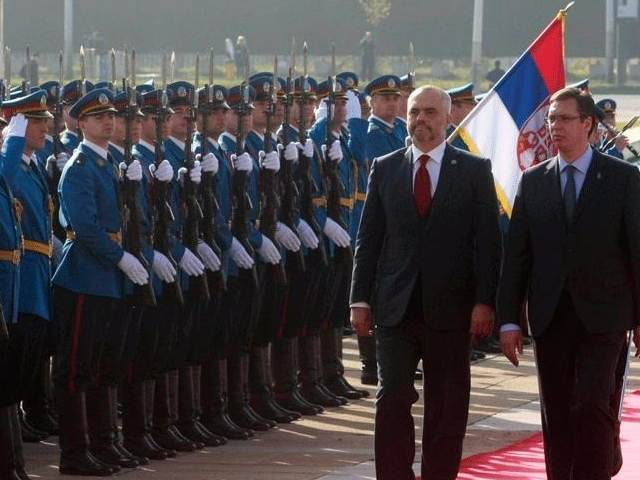

Joint Chamber Aims to Boost Serbia-Albania Trade

Joint Chamber Aims to Boost Serbia-Albania Trade - 2016-10-17
The launch on Friday of a joint Serbia-Albania Chamber of Commerce in Nis is intended to enliven currently weak economic ties between the two countries - but not everyone expects it to succeed.
Albania and Serbia are to have a joint commerce chamber, based on an agreement to be signed on Friday in the southern Serbian town of Nis, where a business forum between the two countries is to be held.
The initiative of BiznesAlbania, an organization of employers and business associations and the Chamber of Commerce and Industry of Serbia is to be launched in the presence of the Albanian Prime Minister, Edi Rama, and his Serbian counterpart, Aleksandar Vucic.
The Nis economic forum will bring together representatives of 160 Serbian and 40 Albanian businesses.
The director of BiznesAlbania, Luan Bregasi, told BIRN that the creation of the joint chamber reflects improved political relationships between the two long-estranged countries.
"We have to reap the advantage of this momentum and create a functioning body that will further connect and improve the relationships of the two countries," he said.
Bregasi believes the new joint chamber will help to improve economic ties between the two countries and take them to another level.
Taking the example of the European Union, which started as an economic union, Bregasi emphasized that collaboration between businesses has the potential to positively influence other aspects of relationships.
"This new institution aims to facilitate business exchanges while the pushing governments of the two countries to pass legislation that improves the business climate. Promotion of businesses is another important duty of this initiative, while the ongoing structured discussion between businessmen from both countries is expected to be very beneficial," he said.
The economies of both countries are improving according to the last report of World Bank on economic trends in the Western Balkan released in September.
This said economic growth in the region was resilient, coupled with falling unemployment levels. In Serbia, growth has risen from 0.7 per cent last year to a projected 2.5 per cent this year. In Albania, the report said, private investment was flowing into infrastructure projects.
Serbia and Albania also are praised for having worked hard to cut their fiscal deficits, which exceeded 6 per cent of GDP in 2014 but are now down to 2.5 per cent.
However, Gjergj Buxhuku, general administrator of Confederation of Albania Industries, told BIRN that he considers the creation of the joint chamber a doomed political manouvre, partly because the issue of Kosovo still dogs relations between Serbs and Albanians.
Economic and trading relationship between the countries are problematic, and the problems will not be resolved through such bureaucratic initiatives, he said.
"Albanian and Serbs need to talk and fairly resolve the major problems that they have over coexistence and long-term collaboration. They need to do this more than try such traditional Byzantine solutions," he said.
"There is no need to create new a organization ... at a time when citizens in both countries pay for state institutions that don't work," Buxhuku continued.
He believes there will be no economically sustainable developments between the two countries if the issue of Kosovo - which declared independence in 2008 but which Serbia still claims as its territory - is bypassed.
"Albanian and Serbs are two neighboring nations but Serbia and Albania are not neighboring countries. In the middle is Kosovo. They cannot bypass Kosovo since every infrastructural, energetic, telecommunication and transport project must pass through it," Buxhuku said.
Arben Shkodra, vice president of the Union of Chambers of Commerce and Industry in Albania, warned Deutsche Welle in Albania in August that trade between Serbia and Albania was still very modest.
The total annual trade volume between Serbia and Albania is not more than 100 million euros, at a time when trade between Kosovo and Serbia is worth around 1 billion euros.
"This relationship also is also unequal, as Serbia has dominated it with 80 per cent of this volume," he said.
Source: BalkanInsight
http://www.balkaninsight.com/en/article/albania-business-representatives-split-over-a-commerce-chamber-with-serbia-10-13-2016







